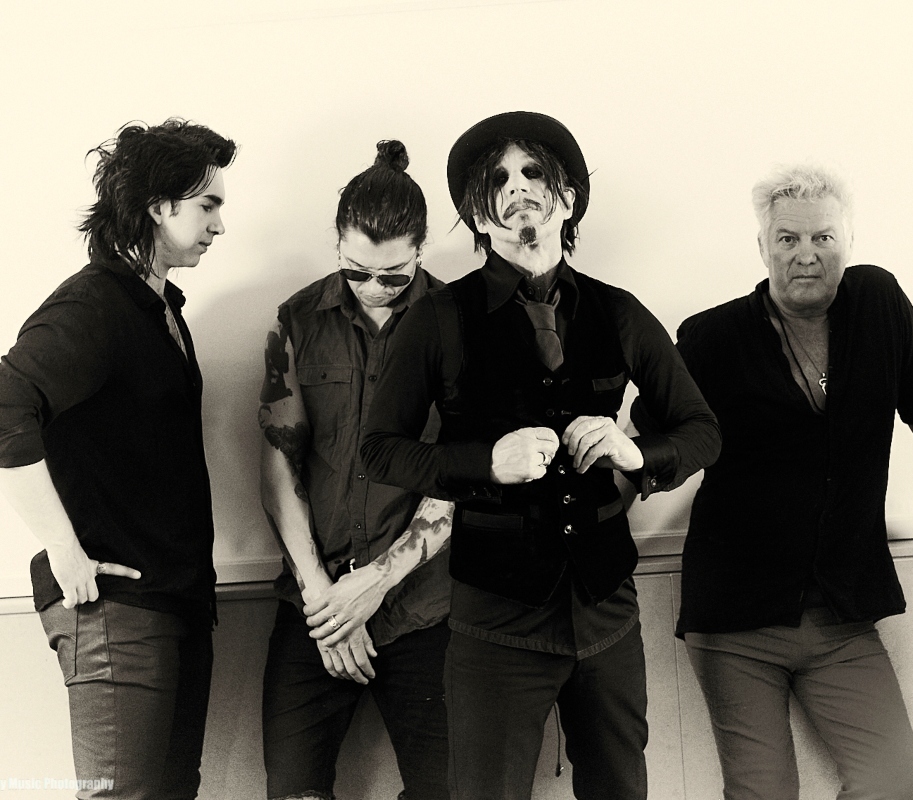Mi-Sex comes home to play at Gibbston Valley Summer Concert
Marjorie Cook
24 October 2020, 6:00 PM
 Former Invercargill musician Murray Burns with Mi-Sex frontman Steve Dalbi. PHOTO: Supplied Greenstone Entertainment
Former Invercargill musician Murray Burns with Mi-Sex frontman Steve Dalbi. PHOTO: Supplied Greenstone EntertainmentIn 1979, the Mi-Sex single "Computer Games" went to No 1 in Australia, made the top 5 in New Zealand and reached the top 10 in Austria, Canada, France, Italy, South Africa and West Germany. For a few short years, the Kiwi band was all the rage with the new wave crowd. Now the band has reformed and is coming to the Gibbston Valley Summer Concert in January 2021. MARJORIE COOK interviews the Southlander at the heart of the band, MURRAY BURNS.
All Mi-Sex keyboardist Murray Burns, 64, has ever wanted to do in life is play in a rock band.
“I just developed a mad passion for it when I was maybe 12, just when I started high school,” the Invercargill born-and-bred musician said.
Advertisement
Advertise on the Southland App
“I basically just discovered what you would call rock music when I was 12 or 13, listening [to a rock show on] Radio 4ZA in Invercargill.
“I scrounged a tape recorder off my aunt and uncle and I used to tape this show. We didn’t have a record player in our house. It just threw my world upside down.
“From that time on schoolwork was boring and I wanted music to be my life. I couldn’t really play anything but I taught myself to play everything a little bit and I just muddled my way through from that point on,” he said.
Mi-Sex (Burns, vocalist Steve Gilpin, bass player Don Martin and guitarist Kevin Stanton) was most active in Sydney, Australia between 1978 - 1986.
Mi-Sex shot to the top of the charts and rode a wave of popularity between 1979 and 1982.
The 1979 Graffiti Crimes album went gold in New Zealand and the 1980 Space Race album went platinum. Singles such as Computer Games, People, But You Don’t Care and Blue Day were on repeat play on the radio.
But Burns’ first attempt at song writing, with friends at Southland Boys’ High School, did not go down very well.
“We had an incredible music teacher called Wally Clark, who wasn’t the motivation for me to get into music. In fact, I think he was motivated by a group of us who were into music and he really wanted to be around us because we were mad on music. It was more him following us than us following him.
“There was a group of us, very focused. Some of them still managed to do their schoolwork and be involved in music. But I didn’t. I managed to do music and that was all I was interested in.”
“We wrote a song for the opening of the new school block in Southland Boys’ High School. It was a bit of a take-off of Jimi Hendrix’s Star Spangled Banner. We didn’t do the Southland Boys’ High School song.
Advertisement
Advertise on the Southland App
“It didn’t go down well with the headmaster, Mr Cornwall, and the Invercargill mayor at the time. But we thought it was hilarious. It really was.”
Burns was discovered by his Mi-Sex bandmates in Wellington.
“They came across me. By the time I was 19 I was playing in clubs in Wellington and I thought I was doing pretty well, you know.
"According to my parents [Isla and Bruce Burns] I was making as much money as they were. I was pretty happy and then three of the guys from Mi Sex - they had a band called Fragments of Time and they were planning to go to Australia.
“They found out about me and all came up to a club I was playing in Wellington on a Sunday night and approached me in a break and said, “We are going to Australia, would you like to come with us”.
“I said ‘Yep. I’ll call you in the morning’, but I knew immediately I was going.
“When I joined, we became Mi-Sex. Kevin, the lead guitarist, and I began writing songs immediately together. We took off in Sydney very quickly. We just hit Sydney at the right time with the right sound.
“We were swept up in the Australian music scene in 1978, very quickly, and we couldn’t believe how into it the crowds were. They didn’t come to have a beer and dance with their girlfriend. They came to watch the band.
“It was only a few years after that, the same thing started happening in NZ. The early 80s was an amazing time for live music.”
Despite its Wellington roots, Mi-Sex was essentially an Australian band.
“We missed the Dunedin Sound. That wasn’t happening when we left. I observed it from Australia and it was a very powerful thing happening in Dunedin. But we had nothing to do with that all. We were gone.”

Mi-Sex, with original member Murray Burns at right. PHOTO: Supplied Greenstone Entertainment
Mi-Sex decided to take a break in 1984, because Gilpin wanted to move to Byron Bay, have a family and build a house, Burns said.
“Sadly, he died in a car accident [in 1992] and we honestly said we are not going to play again, it is not going to happen . . . It was 2011 when Don Martin and Steve Dalbi met and decided. Steve invited himself in front of us. He said, “Let’s do it. It will be great”. He loves the songs and was a great fan. . . He just wants to front the band and he is so good at it.”
Early music video clips show Burns playing keyboard in a new wave suit and his hair gelled up in a fright. Does he still dress like that?
“’Fraid not, ‘fraid not! Hey, I still have plenty of hair. It is just a different colour. That was a little flash in the pan, that one. I mean, I was very happy to get rid of that and put on my leather jacket.
“Sometimes you try things. We had a very pro record company, CBD Records, who when we put out Computer Games, they went “Wow! That’s where it is going”. They got so excited about this sort of thing and I wished they would just go away. I just wanted to be in a rock band.”
Burns pauses to laugh. “It was good. When I look back, I think it was great. It is a memory.”
After Mi-Sex stopped playing, Burns worked with other musicians, including Colin Bayley, the co-writer of Blue Day.
He and Bayley began composing for television and film, something Burns said he had to be dragged into kicking and screaming. “I was only 26. I was actually happy to still be playing in bands.”
However, they soon began a new wave of music for television, using synthesisers and drum machines.
“This was well before samplers and pro tools and all that thing. We were still using tape recorders. We were doing a lot of well-known Australian TV and ended up having four or five composers working with us, mostly from New Zealand. We did that for 20 years. We had a really busy time in Sydney, doing a big chunk of Australian TV, a bit of film, no advertising . . .
“It was funny. I would spend weeks working on one song for Mi-Sex on the piano in my bedroom and all of a sudden, I had to write 30 pieces of music a week. It just tipped me on my head, you know. It was great, a real shot. I loved it.”
Advertisement
Advertise on the Southland App
Once Burns got into the swing of it, he realised he was on the edge of something quite new.
“It was before Midi came along and before using computers for music . . . It was an amazing time to be at the forefront of it. It was really exciting.”
He moved to Byron Bay for a change of focus.
“I mentor a lot of young people up here and I produce bands. I do a bit of everything. Now that Mi-Sex has come along, I probably play about 20 shows a year with the band. So, I am doing a bit of everything.”
After 45 year in the music industry, his passion for rock bands has never waned.
The group broke its long hiatus in 2011 to perform a fundraiser concert in Christchurch after the earthquakes.
Burns is now the only survivor of the original four-man line up. Gilpin died in 1992, Stanton in 2017 and Martin in August this year.
Various other artists have also been part of the band-scape, including Richard Hodgkinson, Paul Dunningham, and Colin Bayley, Phil Smart and Steve Osborne.
In January next year, Burns will be lining up at the Gibbston Valley Summer Concert with vocalist and frontman Steve Dalbi, guitarist James Cooper, drummer Jordan McDonald and bass player Travis New.
The present line up is, apart from Burns, an all Australian affair and they have been playing together a good long while - Dalbi since the 2011 fundraiser in Christchurch.
Advertisement
Advertise on the Southland App
Was it hard to start again, reforming Mi-Sex?
“Oh no, no, no. It was like riding a bike. I was playing bass for a cover band in Byron Bay five to six years prior to that. We do still play occasionally, though not at the moment. We are a very noisy rock band . . . When the guys from Mi Sex came up to my studio in Byron Bay and had a rehearsal, it was so natural and so easy, we all loved it. And the songs still sound pretty reasonably current.”
After the 2011 Christchurch fundraiser the band performed several concerts on both sides of the Tasman, but the travel became wearisome.
Martin was then diagnosed with prostate cancer and eventually decided he didn’t want to play anymore. He encouraged Burns and the others to keep going.
“So we have 10 shows booked and nothing after that. We will see how it feels,” Burns said of next year’s trip to New Zealand.
Burns has never played at a Gibbston Valley concert but has friends and a goddaughter living in Queenstown so is looking forward to his return home.
After next year’s tour he intends to stay in the South Island to catch up with his Dad in Christchurch (his Mum has died) and his friends and family.
“I haven’t seen the family for a year now. I would usually fly in three or four times a year.”
“I come to Invercargill quite often. I do work with the music and sound studios at Southland Institute of Technology. So, I have had quite a strong connection with Invercargill in the last 10 years, sometimes coming two or three times a year.”
Gibbston Valley Summer Concert, Queenstown.
Acts: Los Angeles-based Kiwi singer-songwriter Gin Wigmore, Mi-Sex ,The Angels, Dragon, and Pseudo Echo.
Concert details: January 23, 9.45am to 6.15pm. Tickets at Eventfinda HERE.




![Nugget Point | Tokata Walks (10-40min) [W] - Nugget Point](https://d3hbehni9j4crp.cloudfront.net/infoPages/5d106947f431d20026d861cd/header_images/header_Nugget%20Point%20DOC%201280x800.jpg)
![Matai Falls (30min) [W] - Papatowai](https://d3hbehni9j4crp.cloudfront.net/infoPages/5d1064bdc536a600266c4c06/header_images/header_Matai%20Falls%20DOC%201280x800.jpg)